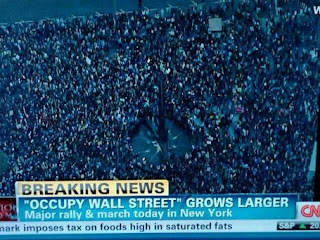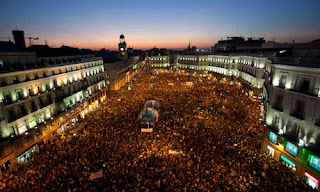As
the Occupy Wall Street (OWS) movement turns two months old, and as many
local encampments face eviction, and winter, I think it’s time we start
re-thinking what it means to Occupy, and planning the next phase of
this movement. Physically occupying public and/or private space was a great tactic, and one that has served its purpose, I believe. People all over the country have been in a state of crippling crisis, while Wall Street banks have been riding high thanks to our bailout. People
have felt helpless, powerless; like they're mere victims of a system that
rewards corruption and seemingly punishes the honest pursuit of the
ever elusive American dream. So having a call to action for a long-term occupation of Wall Street served as a
galvanizing force: Off of the couch and into the streets! That call to action resonated with the masses and manifested in the creation of long-term occupations all over the country.
I don’t think everyone realized how pissed off they were until they started seeing other pissed-off people gathering at Zuccotti Park and at encampments throughout the country. Like I mentioned in an earlier post, the more that people participated, the more others began to participate. So, the physical occupation was key in creating an actual space for people to come together and start to dialogue about the state of the mess we're in. That alone is some powerful stuff, especially in this day and age when we tend to gather online rather than in person. Plus, the encampments were more than a few tents pitched in a common area; they were (are) a self sustaining community that provided a model of radical inclusion, mutual support and direct democracy. Direct democracy is exhausting, by the way. Awesome, but incredibly exhausting.
Aside from the gathering/community building that the occupation of physical space resulted in, these encampments were (are) the visual symbol of this movement. You cannot ignore the fact that thousands of people are living in tents in cities and towns all around the country. I don't know about you, but I literally have to walk through the encampment in Philadelphia to get to my office. I could not ignore it if I tried.
You know who else can't ignore it? The media. And because the media cannot ignore the Occupy movement, neither can anyone else who's not living under a rock. Rather than just covering the marches and direct actions, the media have been covering the evictions, General Assemblies, protester/City relations, public health and safety concerns, and anything else that happens at camp. As the old adage goes, all press is good press, to a point (more on that later). The end result is that people are paying attention and are talking about this movement. And not just supporters, either; there are several folks who either don't understand what it's all about, or who totally oppose it. But the commonality is that just about everyone is talking about what's going on and has an opinion about it, thanks to the media coverage.
Despite the positives associated with the occupation of physical space, there are also several negatives, especially in the context of a long-term movement. For starters, the folks who are actually occupying represent a tiny fraction of those of us who identify with and support the movement. At it's peak, the encampment in Philadelphia had close to 400 tents. Currently, the Occupy Philadelphia facebook page has over 27,000 "likes", and based on what I hear in my social and professional circles, there are many, many more who support what's going on in one way or another. So, while the camp is the visual face of the movement, it's really not. Much of the negative press stems from the actions of a select few, and then those actions become the official soundbites or headlines coming out of Occupy Philly. And while I do believe that all press is good press as a general rule of thumb, I
also think that perception matters, and that too much bad press over an
extended period of time is just bad.
Having the encampments as the loci of the movement has resulted in the following: 1) Many of us are unable to participate in any real way (can't camp, can't regularly attend General Assembly, can't participate in several week-day direct action activities) and therefore feel slightly removed from the action; 2) Onlookers and potential supporters are only getting a partial view of a much broader group, and are basing their opinions of the movement on the actions of the smaller group, and 3) The general public thinks that the Occupy movement is synonymous with the occupation of physical space, and it is not, at least in my humble opinion. The occupation of physical space is one tactic in a much broader movement, and I personally think that it's time to consider other, more sustainable tactics to pursue as the the movement progresses from infancy to toddler-hood.
Another negative of focusing too much on the camping aspect of the movement is that it diverts the energy and focus from matters of corporate greed and economic injustice to matters of permits, plazas and police. Here in Philadelphia, all we've been hearing about lately is whether the camp is moving to a new plaza and whether or not they need a permit. Personally, I think we have significantly bigger fish to fry.
And that brings me to the most immediate downfalls of a continuation of the tent tactic: 1) Evictions are plaguing many locales, and 2) winter is upon us. Many see the recent wave of evictions as defeat, but I see them as an opportunity. Truth is, voluntarily camping on cold, city concrete in the snow and ice is just not a sustainable idea. And again, since the encampments are so highly visible, the media will feed on the dwindling numbers of tents rather than report on what's actually happening outside of the encampments. Let's face it, the physical occupations will probably be fairly lifeless and rather transient over the winter months. Rather than react and retreat in response to evictions and/or harsh weather, how about we just proactively recognize the strengths and limits of certain tactics, and move on to phase two of the movement. There is no shame in heading indoors for the winter.
Who knows what phase two will look like, or what the goals will be. Perhaps more coordinated efforts between and among the various Occupation cities; maybe a clear message with specific demands and a strong idea of what success will look like, and hopefully an organized force that continues to influence the political discourse in this upcoming election year. I don't really know. But I do believe that the movement is at a crossroads, and we have an opportunity to pause, ponder and progress the Occupy movement in a positive and meaningful way. Regardless of what happens in the future, no one can deny the power of what has unfolded in these past two months.



















3 comments:
That is some great writing lovie.
well put and beautifully written, for a change.
Excellent! I wish the occupy movement in Amsterdam was as great as in The States.
Things must change and i believe somewhere along the line they will. You keep pushing than at one point the other party will push back.
Great written piece! 2 thumbs up!
Post a Comment